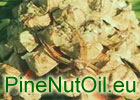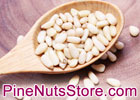Siberian Gift - Pine Nut Oil
A. V. Dyadigurov, Yuriy Vasilevich Ten, P. L. Meshalkina
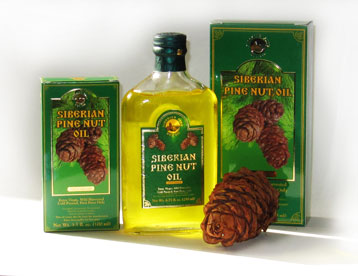 From days of old in Siberia and the Urals, the kernels of Pine nuts have yielded oil that was considered to be a delicacy. It significantly surpasses the best types of olive oil obtained from olives, is readily assimilated by the body, possesses high nutritional and medicinal properties, is unusually rich in vitamins and minerals. Pine nut oil can substitute for any vegetable oil (sea buckthorn, burdock, coconut, olive, almond, etc.) in all situations of medical use. In its calorie content, Pine nut oil exceeds beef and pork fats, while in its ease of assimilation it far exceeds eggs. It can be used in any recipe as a substitute for any vegetable oil. It facilitates the removal of heavy metal salts from the body. Pine nut oil is impossible to replace completely with anything else!
From days of old in Siberia and the Urals, the kernels of Pine nuts have yielded oil that was considered to be a delicacy. It significantly surpasses the best types of olive oil obtained from olives, is readily assimilated by the body, possesses high nutritional and medicinal properties, is unusually rich in vitamins and minerals. Pine nut oil can substitute for any vegetable oil (sea buckthorn, burdock, coconut, olive, almond, etc.) in all situations of medical use. In its calorie content, Pine nut oil exceeds beef and pork fats, while in its ease of assimilation it far exceeds eggs. It can be used in any recipe as a substitute for any vegetable oil. It facilitates the removal of heavy metal salts from the body. Pine nut oil is impossible to replace completely with anything else!
Pine nut oil is a unique natural product that has no analogy in nature, its synthesis is impossible. 100% natural Siberian Pine nut oil is prepared by the cold pressing method from selected kernels of the Siberian Pine.
We invite you to make its acquaintance.
Medicinal importance
At the present it has been determined that Pine nut oil contains various substances that helps to promote the preservation of a person's ability to work for many years. Pine nut oil improves the composition of the blood, and helps prevent the development of tuberculosis and anemia. The oil is used for prophylactic purposes in atherosclerosis, hypertension, cirrhosis of the liver, stomach and duodenal ulcers, shortness of breath, and silicosis, and facilitates the treatment of patients suffering from leukemia.
The oil contains a high quantity of vitamin E (tocopherol, 56 mg for 100 g), which promotes the restoration of male potency, the preservation of a high capacity for work, the assimilation of proteins and fats, and treatment in cases of illnesses of the liver, pancreas, intestines, atherosclerosis, and rheumatism. Tocopherol translated means "I bear life." Pine nut oil also contains significant quantities of vitamins P, A, B, which are essential for the normal development and functioning of the human organism.
The oil is composed of unsaturated fatty acids (Table 1), including those not synthesized in the human body -- linoleic, lineolenic, and arachidonic acid, which possess an antisclerotic action. They have a normalizing effect on the walls of the blood vessels, increase their elasticity, and lower their permeability. It has been determined that linoleic acid possesses a neutralizing effect for many poisons. In this regard, Pine nut oil is extremely necessary for a population that lives in cities, where the atmosphere is strongly polluted by gaseous emissions.
Table 1
Fatty acid composition
| Name of the component | Group | Detector | Time | mVs | Height mV | Concentration % |
|---|---|---|---|---|---|---|
| C 16:0 palmitic | PID-2 | 0:34:18 | 307.6 | 68.321 | 3.8149 | |
| C 18:0 stearic | PID-2 | 0:37:57 | 189.84 | 36.03 | 2.3545 | |
| C 18:1 oleic | PID-2 | 0:38:26 | 1794.7 | 326.81 | 22.258 | |
| C 18:1 cis-oleic | PID-2 | 0:38:54 | 131.15 | 23.041 | 1.6265 | |
| C 18:2 linoleic | PID-2 | 0:39:30 | 3867.4 | 631.95 | 47.964 | |
| C 18:3 linolenic | PID-2 | 0:40:03 | 1717.2 | 275.97 | 21.297 | |
| C 18:3 linolenic | PID-2 | 0:41:06 | 20.279 | 2.8896 | 0.25151 | |
| C 20:0 arachidonic | PID-2 | 0:42:43 | 23.627 | 28.515 | 0.29303 | |
| C 22 behenic | PID-2 | 0:46:10 | 11.353 | 1.1444 | 0.1406 | |
| 8063.1 | 1369 | 100 |
Thus, Pine nut oil may be successfully used for medicinal purposes in many illnesses and in the treatment and prophylactic nutrition of employees whose work is related to toxic substances.
Nutritional importance
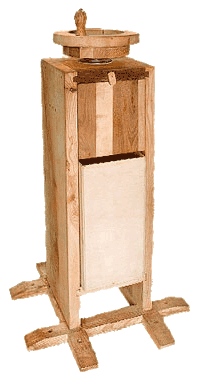 |
| Pine Nut Sheller |
In its biological value, the vegetable oil obtained from the Pine nut exceeds olive oil produced from olive trees, which, in the absence of Pine nut oil, is considered to be the best in the world.
The energy value of one gram of Pine nut oil is high, and comes to 9 kCal. The composition of this oil includes vitally essential irreplaceable components, among which are those involved in lipotropic and antisclerotic activity (polyunsaturated fatty acids, vitamins A, E, and others). The ease of assimilation of the oil is high: 95-98%.
Pine nut oil may be used with great effect in cooking, in the production of confectionary goods of the highest quality, mayonnaises, margarines, and in the preparation of vegetable dishes and tasty additives.
Ecological importance
Pine nut oil is the purest in comparison to other vegetable oils. While sunflower, cotton-seed, soya, mustard, rape, and other oils are obtained from agricultural crops grown on soils fertilized with various chemical substances and treated with pesticides, Pine stands in Siberia are not subjected to these types of supplements and treatments, so this oil is ecologically pure.
Chemical composition of Pine nut oil
The vitamin E content of Pine nut oil exceeds that of olive oil by five times and coconut oil by three times. The concentration of vitamin F in the oil is three times greater than in the cod-liver oil based Vitamin F preparation sold in pharmacies.
Use of Pine nut oil in medicine
On the appearance of symptoms of any disease, see a physician. Pine nut oil is used as a supplementary remedy for the basic course of treatment.
Internal Medicine - as an excellent remedy for tonsillitis, respiratory illnesses, and influenza.
Gastroenterology - in erosive ulcerous lesions of the stomach and duodenum, superficial gastritis and bulbitis, chronic pancreatitis, post-resection disturbances of a peptic ulcer, gastritis of the stump of the stomach, anastomositis, esophagitis, cholecystitis, and hepatocholecystitis.
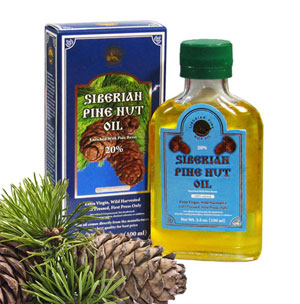 |
| Pine Nut Oil with Sea Buckthorn |
Obstetrics and Gynecology - in erosive ulcerous lesions of the neck of the uterus. Recommended for pregnant women to prevent fetal mutation and as an essential, easily assimilated natural vitamin preparation, which additionally has a slight purgative effect.
For nursing mothers - as an agent: a) that increases the level of lactation; b) that improves the composition of the milk; c) that prevents the formation of intestinal pain in infants.
Pediatrics - indispensable in child nutrition from the first year of age, since it promotes the growth of the human organism.
Surgery - as an agent to accelerate the joining together of tissues in the postoperative period and for the healing of sutures and scars, as well as in varicosis. It is a healing agent.
Dentistry - as a remedy for stomatitis, parodontosis, parodontitis, and as an analgesic and antibacterial agent.
Proctology - in hemorrhoids and lesions in the tissues of the rectum.
Neurology - to normalize the activity of the nervous system.
Dermatology - as an agent to fight dandruff and hair loss. To fight bedsores. It prevents the development of dermatitis in children. Used in the treatment of burns and frostbite by rubbing or applying dressings soaked in the oil. The dressing should be changed each day.
Immunology - as a highly effective agent for stimulating the immune system.
Endocrinology - against diseases of the thyroid gland.
Cosmetology - as masks to prevent the fading of the skin. It strengthens the nails and hair, softens the cuticles, the skin of the hands, feet, and entire body. Massage with the use of Pine nut oil eliminates fatigue, improves peripheral blood circulation, improves lymphatic drainage, eliminates venous congestion in the extremities, improves the elasticity of the skin, increases vitality. Use of the oil in a bath, in a sauna while rubbing into the skin promotes the rejuvenation of the dermal layers and the healing of wounds.
Contraindications. Pine nut oil is not recommended to be taken by persons with a heightened sensitivity to products obtained by the processing of Pine. At the present time, there are no known contraindications to the use of Pine nut oil.
Daily doses for the use of Pine nut oil
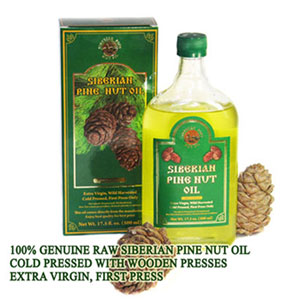 |
| Pine Nut Oil with Rose Hip |
The recommended daily doses for the use of Pine nut oil have been submitted by A.N.Litvintsev, the Head of the Department of Food Hygiene at the Irkutsk Medical University.
Prophylactic doses
As part of the daily food allowance for a healthy person, 28-30 g (without the use of other oils of vegetable origin).
Therapeutic doses
With the appearance of symptoms of any disease, see a physician. Pine nut oil is used as a supplementary, natural remedy to the basic course of treatment.
In cases of an aggravation of a peptic ulcer of the stomach and duodenum, it is recommended that patients take Pine nut oil (in its pure form and as an additive to food) in the amount of 27-36 g daily. The enrichment of an ulcer-healing diet with Pine nut (vegetable) oil is pathogenetically well founded. The oil suppresses the secretion of hydrochloric acid and regulates the acid-forming function of the stomach, and the fat soluble vitamins it contains promotes the processes of the regeneration of the mucous gastroduodenal area. It has a beneficial action on the functions of the intestine, promotes the evacuation of the gallbladder and the elimination of constipation.
In chronic gastritis with increased secretions (of gastric juice, hydrochloric acid, pepsin), 25-30 g taken 30 minutes before eating.
In cases of anemia, 18-20 g.
In atherosclerosis (without excess body weight) with lesions on the vessels of the heart, brain, or other organs, ischemic heart disease caused by atherosclerosis, 32 g (out of the 80g of the daily norm of total fats), in the case of accompanying obesity, 28 g (out of the 70g of the daily norm of fats).
In hypertension on a background of atherosclerosis, 32 g (out of the 80g of total fats per day).
In cases of an aggravation of hypertension (in the initial period of the disease -- stage IIB - III A), 17-21 g (out of the 70g of total fats per day). Butter is used for the preparation of food, Pine nut oil is added to the dishes. Meat fats and culinary fats are excluded from the diet.
In cirrhosis of the liver with moderate insufficiency, 17-18 g.
In rheumatism, 27-30 g.
In tuberculosis, 24-25 g.
In leukemia, 21 g.
In chronic nephritis without exacerbation, 22-25 g.
In obesity, 24 g (out of the total daily quantity of 80-85 g).
In kidney stones with alkaline reaction of the urine, 30 g.
In sugar diabetes, mild and intermediate degree, 22-24 g (out of 75 to 80 g of the daily allowance).
Recommendations of Specialists
The Pine nut oil produced by the Siberian Pines Company is a 100% natural, ecologically pure preparation with unique therapeutic and health improving properties, which stem from a high content of biologically active substances, essential fatty acids, and trace elements necessary for the normal growth and development of children. At a time when synthetic and modified ingredients are prevalent in food, an energy deficit inevitably develops in the organism. This manifests itself in the heightened susceptibility of children to various infections, complicated and protracted courses of respiratory and viral diseases, a lowering of vitality, and a lagging behind in physical and neuropsychological development.
The natural components of Pine nut oil in essence are a concentrate of liposoluble vitamins A, D, F, K, E, and essential phospholipids, and contain such rare trace elements as molybdenum, vanadium, manganese, and iodine, which are essential for the normal functioning of the entire hormonal enzymatic complex of the organism. The preparation has a significantly lower allergic potential in comparison to other oil preparations, sea buckthorn for example, which, of course, is important in its use among children.
The regular use of this true elixir of the Pine significantly increases the delivery of vitally necessary substances into the organism. Your child will grow up strong and healthy, the unavoidable respiratory and viral infections will run their course significantly more easily and without complications. His or her physical and intellectual potential will increase.
Recommended prophylactic doses:
for children up to 1 year of age, 1 drop for 1 kg of weight per day (watch for any reactions in the child); for children from 1 to 3 years of age, from 1 to 3 ml every day (watch for any reactions in the child); for children from 3 to 5 years of age, 5 ml every day (watch for any reactions in the child); for children from 5 to 10 years of age, from 5 to 10 ml per day (watch for any reactions in the child); for children older than 10 years, from 1 tablespoon per day.
A. V. Dyadigurov Pediatric Intensive Care Physician Physician of the Highest Category
* * *
Pine nut oil promotes the healing of wounds and sutures. It is an antiseptic and an agent that promotes rapid healing. It may be used both externally (rub into the ulcers, wounds, and sutures) as well as internally (take 1 teaspoon three times per day).
Yuriy Vasilevich Ten Krai Chief Pediatric Surgeon Doctor of Medical Sciences Head of Surgery at the Altai Krai Clinical Children's Hospital
* * *
Pine nut oil may be taken to accelerate the regenerative processes in the postoperative period in the form of applications to the areas of postoperative sutures. Also possible is local use in the pathology of the neck of the uterus (erosion of the neck of the uterus).
In internal use, it is a source for the rejuvenation of the organism, completing the balance of vitamins and trace elements in pregnant women and patients in the postpartum period.
P. L. Meshalkina Obstetrician and Gynecologist
Prepared by: A. V. Dyadigurov, Yuriy Vasilevich Ten, P. L. Meshalkina
http://www.pinenutoil.org/
Used by permission.
© Copyright CedarInfo.info





